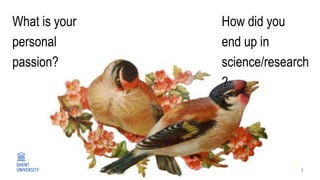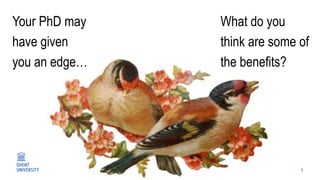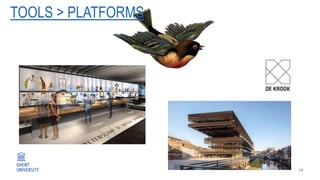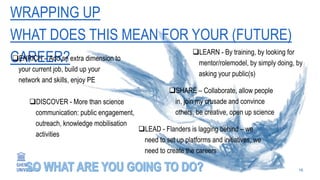The Skills Cross-over: building a career through science communication
- 1. 1 Building a career through science communication Esther De Smet
- 2. 2 Discovering your personal drivers Plugging the benefits of your PhD Identifying the impact of your scicomm Getting your story straight & meeting the right people Choosing the tools for your public engagement
- 3. 3 What is your personal passion? How did you end up in science/research ?
- 4. 4 Solving puzzles Curiosity Enjoying experiments Awe of /fascination for culture/nature Creative streak / Love of freedom Love of learning and teaching Do good DRIVERS Have an impact / make a contribution
- 5. 5 Your PhD may have given you an edge… What do you think are some of the benefits?
- 6. 6 Teaching experience Closer scrutiny of the literature Credibility with academics Access to jobs at trade publications and agencies Used to hard work and making things work Open to editing Used to deadlines Richer, true-to-life writing about science Abundance of ideas Knowing where the stories are Understanding of realities/nuances of science Networking BENEFITS
- 7. 7 • Clear goals, clear target public(s) • Realistic budget, ROI • Evaluation, reflection, knowledge sharing Consistency • Clear strategy, relevant expertise/skills • Involving target public(s), their needs • Position in existing offer Effectiveness • Diversity, dialogue • Products or process? • Skill development Normative criteria IMPACT Science communication Assessment Instrument, Rathenau Institute (2017)
- 8. 8 IMPACT Show your passion Power of being personal Right & well- told story Be a leader Community of support Five key points of being a good communicator, Nancy Baron (2010) Storytelling Network
- 9. 9 WHAT WILL RESONATE WITH OTHER PEOPLE? > Central image + Point of connection > Balancing less vs more > What is your main message? > Narrative STORYTELLING
- 10. 10
- 11. 11 NETWORK Within your own organisation For your research Outside your organisation For your communication In the end, the challenge is to gain the trust and respect of those with whom you are trying to engage. (Fisk & Dupree)
- 12. 12 TOOLS 1. Do not put the tool before the message 2. Find the right match
- 13. TOOLS > WHAT DO YOU DO? A. I tweet and facebook my a** off B. I spam newspapers and other written media with my ideas C. I traumatise children and youngsters during outreach sessions D. If there’s a stage, I’m on it E. I’m a true hipster so podcasting is my thing F. Writing is so old school. I vlog, instagram, pin, draw, create installations… G. My PE stuff is so cool, there’s no label for it H. Leave me alone. Scicomm is for egomaniacs 13A. B. C. D. E. F. G. H. 0% 0% 0% 0%0%0%0%0%
- 15. 15 Discovering your personal drivers Plugging the benefits of your PhD Identifying the impact of your scicomm Getting your story straight & meeting the right people Choosing the tools for your public engagement
- 16. 16 WRAPPING UP WHAT DOES THIS MEAN FOR YOUR (FUTURE) CAREER? DISCOVER - More than science communication: public engagement, outreach, knowledge mobilisation activities SHARE – Collaborate, allow people in, join my crusade and convince others, be creative, open up science LEARN - By training, by looking for mentor/rolemodel, by simply doing, by asking your public(s) LEAD - Flanders is lagging behind – we need to set up platforms and initiatives, we need to create the careers ENRICH – Add an extra dimension to your current job, build up your network and skills, enjoy PE
- 17. THE SKILLS CROSS-OVER “You can think of research as one of your many useful skills, one that may come in handy in whatever job you have, but not necessarily your primary skill, and certainly not your primary identity. You are welcome to think instead of yourself as a teacher, or an analyst, or a problem solver, or a communicator, or as a community builder. These are all fine. You can think of yourself as a marketer or salesperson, or as a writer or editor, or as an artist or thinker. Don’t let the fact that you have a PhD limit the way you see yourself.” Jennifer Polk 17
- 18. 18 @ResearchUGent THANK YOU FOR PARTICIPATING! Esther De Smet Research Department March 2017
Editor's Notes
- Turn to your neighbour
- Not ‘target audience’: deficit model
- With a public defined, academics must determine how to appropriately engage with that particular community before people listen. (Andrew Hoffman)


















